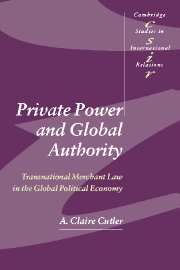Book contents
- Frontmatter
- Contents
- Acknowledgments
- Acronyms and abbreviations
- 1 Introduction
- 2 Conceptualizing the role of law in the global political economy
- 3 Theorizing the role of law in the global political economy
- 4 Medieval lex mercatoria
- 5 State-building: constituting the public sphere and disembedding the private sphere
- 6 The modern law merchant and the mercatocracy
- 7 Conclusion: Transnational merchant law and global authority: a crisis of legitimacy
- References
- Cases cited
- International treaties and United Nations documents
- Index
- CAMBRIDGE STUDIES IN INTERNATIONAL RELATIONS
7 - Conclusion: Transnational merchant law and global authority: a crisis of legitimacy
Published online by Cambridge University Press: 01 March 2010
- Frontmatter
- Contents
- Acknowledgments
- Acronyms and abbreviations
- 1 Introduction
- 2 Conceptualizing the role of law in the global political economy
- 3 Theorizing the role of law in the global political economy
- 4 Medieval lex mercatoria
- 5 State-building: constituting the public sphere and disembedding the private sphere
- 6 The modern law merchant and the mercatocracy
- 7 Conclusion: Transnational merchant law and global authority: a crisis of legitimacy
- References
- Cases cited
- International treaties and United Nations documents
- Index
- CAMBRIDGE STUDIES IN INTERNATIONAL RELATIONS
Summary
This chapter argues that fundamental reconfigurations of global power and authority are creating a legitimacy crisis in the global political economy. It makes the case for a new theory of international law that is both capable of addressing the analytical, theoretical, and ideological dimensions of this crisis and working towards its resolution. The chapter begins by positing the existence of a global constitutional order centered on Westphalian conceptions of authority and rule and argues that all such orders require some degree of fit between their principles and practices. A legitimacy crisis exists when there is a disjunction or asymmetry between theory and practice that becomes so great that it strains the foundations of the order. Processes of juridification, pluralization, and privatization are transforming structures of authority, “which implicitly challenges the old Westphalian assumption that a state is a state is a state” (Cox, 1993 a: 263) and related understandings about the “public” nature of authority that we have discussed. Traditional Westphalian-inspired assumptions about power and authority are argued to be incapable of providing contemporary understanding or locating the authority and historical effectivity of transnational merchant law. This is producing a growing disjunction between the theory and the practices of the Westphalian system. This disjunction suggests that the fields of international law and organization, which are generally regarded as repositories of our theoretical and empirical understanding about global authority and rule, are experiencing a crisis.
- Type
- Chapter
- Information
- Private Power and Global AuthorityTransnational Merchant Law in the Global Political Economy, pp. 241 - 262Publisher: Cambridge University PressPrint publication year: 2003

